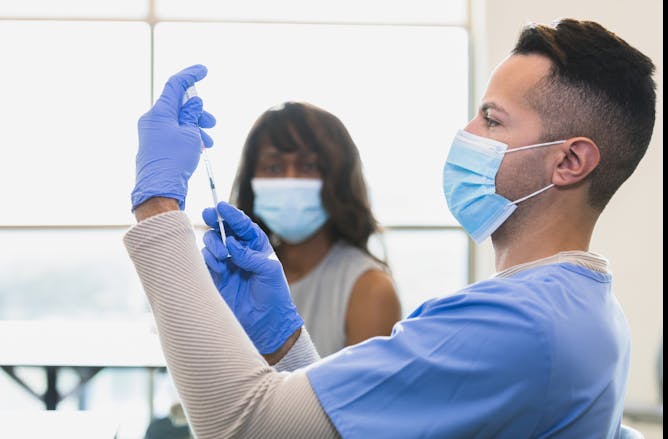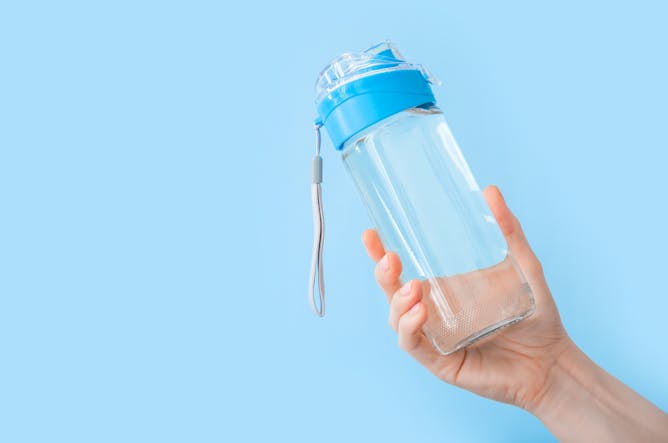|
An expert committee yesterday recommended that the FDA authorize COVID-19 vaccines that match the current coronavirus variants. These omicron-specific vaccines – as well as the Novavax COVID-19 vaccine – could be available as early as this fall. Immunologists Prakash and Mitzi Nagarkatti from the University of South Carolina explain the many considerations for deciding on when to get a COVID-19 booster shot as well as the potential benefits of mixing different vaccines.
In another story involving the FDA, the regulatory agency recently agreed to reconsider the safety of the chemical BPA in food packaging. Chemistry professor Benjamin Elling from Wesleyan University provides a deep dive into this endocrine disruptor, why it leaches out of plastic, and why it’s so challenging to develop replacement chemicals.
Many of us will be going to cookouts this coming July 4 weekend and, though it’s not likely the first thing on people’s minds, food safety should be seriously considered, writes Elena Naumova, a Tufts University epidemiologist and data scientist. Naumova details the most common food-related pathogens people should be aware of and notes that power outages, caused by storms, heat waves or wildfires, are a growing problem for food storage.
Also in this week’s science news:
|

Clinical studies show that mixing and matching booster vaccines can lead to a more robust immune response.
SDI Productions/E+ via Getty Images
Prakash Nagarkatti, University of South Carolina; Mitzi Nagarkatti, University of South Carolina
On the horizon: A new omicron-focused version of the Moderna vaccine that may offer longer protection and a stronger immune response.
|

Most plastic products that are clear and strong are made using bisphenol A, or BPA.
Beton Studio/iStock via Getty Images
Benjamin Elling, Wesleyan University
The US Environmental Protection Agency is reexamining the health effects of bisphenol A. A chemist explains why BPA is in plastics and why it’s hard to find a safe replacement.
|

Dairy, meats and eggs can get risky when left in warm conditions.
Westend61 via Getty Images
Elena N. Naumova, Tufts University
Climate change has a clear link to rising foodborne illnesses. Blackouts during heat waves and wildfires are a growing part of the problem.
|
|
|
-
Rebecca Seal, University of Pittsburgh Health Sciences; Benedict Alter, University of Pittsburgh Health Sciences
Different painkillers provide relief in different ways. The most effective medication is the one that best targets the type of pain you’re experiencing with minimal side effects.
-
Kyle Mahowald, The University of Texas at Austin College of Liberal Arts; Anna A. Ivanova, Massachusetts Institute of Technology (MIT)
Fluent expression is not always evidence of a mind at work, but the human brain is primed to believe so. A pair of cognitive linguistics experts explain why language is not a good test of sentience.
-
Denise Su, Arizona State University
The Earth has had at least five major ice ages, and humans showed up in time for the most recent one. In fact, we’re still in it.
-
Emily M L Southard, Penn State; Heather Randell, Penn State
As crops fail in the rising heat, men are leaving many rural areas for migrant work in cities. Women are left to tend to the farming in increasingly dangerous conditions.
-
Merritt Drewery, Texas State University
Feeding insects instead of grain to animals is an inexpensive, sustainable way to increase the world food supply. An animal scientist explains what’s involved in developing insect feed for cattle.
-
Marjorie Montanez-Wiscovich, University of Florida; Arthur Mark Samia, University of Florida
These infections require medical attention right away.
|
|